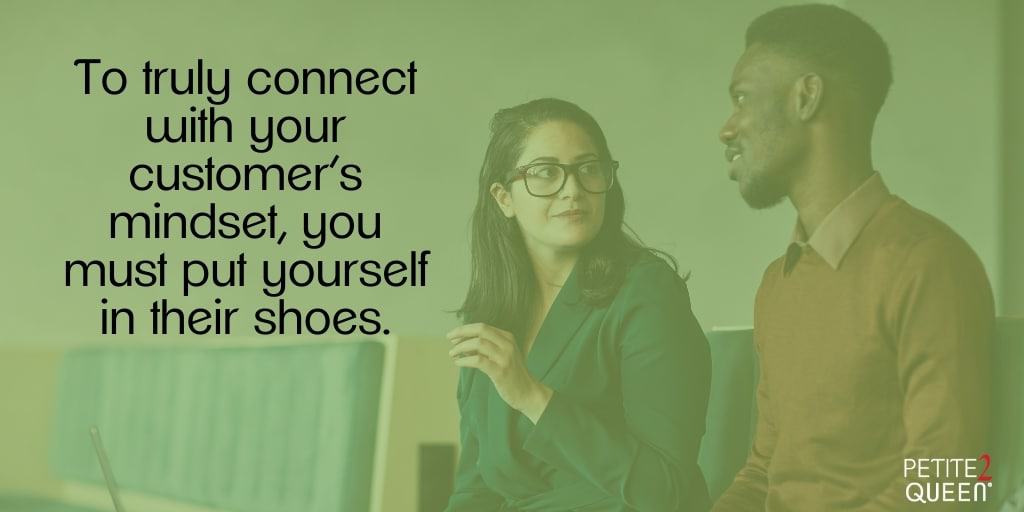I’ve been building up a relationship with a potential client for months. We have really great conversations, but she hasn’t made a commitment. I’m getting impatient to make the sale, but I don’t want to harm the relationship I’ve worked so hard for. How can I get this client to actually buy – soon – without alienating her? – Coleen in Laurel, DE
Answer:
There is a symbiotic association between the sales process and relationship progression. When you focus on how you can serve your clients, you are showing your respect and communicating your sincere interest. Not what you can get out of them. This translates to authenticity, integrity, and credibility — the core building blocks for great professional relationships.
Client’s Perspective
Early in my sales career, I had a customer tell me that the only truth, in the eyes of the customer, was their own perception. At that moment, everything clicked. I realized what I was missing and how I could be more effective. To truly connect with your customer’s mindset, you must put yourself in their shoes.
What do they want, need, or lack? What’s in it for them? What’s their desired outcome? How does your customer perceive the benefit? Now flip this around to how your product or service benefits the outcome desired by the customer. Then, to captivate your customers, you must frame your answer to their “why” with their underlying motivation.
Understanding your prospect’s motivation allows you to position your product or service to fit their desires. Motivation is the key reason why any of us do anything. In general, B2B buyers are motivated by some combination of Profit/Gain, Preventing Loss, and Cause Affiliation. Understanding your client “why” is the secret sauce to positioning your product or service.
Building a Relationship
You work with smart people who are qualified and capable of making good decisions for their organizations. Creating relationships that recognize these attributes reflects your worthy intent. Throughout the sales journey, you must diligently continue to learn everything you can about the individuals and company. In the process, you are able to dig deeper to identify and uncover possibilities for your products and services that the customer has not visualized. It goes far beyond the specifications and requirements at the surface of a challenge or objective. It’s finding the perfect fit.

Discovery and Closing Questions
As you cultivate your new relationship, you ask discovery questions to learn more about their goals, objectives, and initiatives. Keep their customer “why” in sharp focus. With B2B sales, there are three levels of customer need: company, department, and individual. We sell to people; therefore, their individual need or “why” is the most important factor.
Questions serve you with a strong and accurate understanding of your client’s processes, situation, and perspective, enabling you to establish the business opportunity. Customers are driven by their needs. They want what they want now. They are not interested in your process. With this in the forefront, you can uncover the internal and external forces for your client and the company. Are there shortcuts or choke points? This is your time to pull up a chair to learn what will impact progress. Such as a new equipment installation that will disrupt their normal operations.
Closing questions help you set the stage to close the sale. The key component of these questions is to validate if you have a match. Clients who are a good fit are empowered and will reward you with referrals and recommendations. Three powerful closing queries are:
- Based on our discussions, do you feel our solution is a good fit for your needs? Why?
- Are there any obstacles that could prevent us from moving forward?
- What are the steps we need to take to help make this happen?
Foundation for Growth and Success
The customer comes to you for an outcome or product. And we want to put our energy into moving the relationship through their needs. By framing your solution within the client perspective, you make it easy for them to move forward with their buying decision. Rapport in a relationship is when your prospect is ready to make a decision. You are actively helping guide them to what they want.
When you nurture your client relationship, you provide consistency and comfort. An empowered customer feels secure. They feel in control. And they feel confident. Consistency is reliance and predictability. To the customer, it’s “I can trust these people.” Your client becomes devoted when you manage their experience. You put energy, passion, and excitement into the relationship.

Lynn Whitbeck is the co-founder and President of Petite2Queen. She is focused on identifying and evaluating opportunities for women at work, helping them define their personal roadmap. She dedicates herself to delivering tools and insights, embracing visualization of the big picture, and identifying and implementing the minutiae of detail. Lynn aims to share lessons learned along her journey and enable positive uplift for women.

